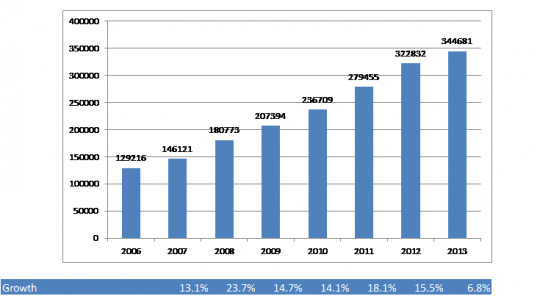Also available in:
Français |
Türkçe
This question is also crucial in terms of growth and competitiveness in the context of the growing economic globalization, where customers and business partners use information and communication technologies in a much more intensive manner.
One of the key prerequisites to promoting economic activities on the Internet is establishing an appropriate legal and regulatory framework. This includes not only laws on electronic transactions, personal data protection and cybercrime, but also provisions pertaining to domain names.
A domain name is, in fact, the starting point of the web presence for businesses, and therefore a critical component for application development, relevant content and local websites. The wimex.mr domain name, for example, is used as the website URL (i.e. Internet address) for a Mauritanian company (
http://www.wimex.mr) and as part of an email address (
info@wimex.mr). Domain names in Mauritania are governed by the country’s electronic communications laws, steering and management committees, and an associative structure named
NIC Mauritanie.
component for application development, relevant content and local websites. The wimex.mr domain name, for example, is used as the website URL (i.e. Internet address) for a Mauritanian company (
http://www.wimex.mr) and as part of an email address (
info@wimex.mr). Domain names in Mauritania are governed by the country’s electronic communications laws, steering and management committees, and an associative structure named
NIC Mauritanie.
 In order to present and discuss international best practices in domain names management, my colleague Arthur Foch and I accompanied a group of experts from the information technology and communication regulatory authority of Turkey and the national authority for telecommunications of Tunisia for a knowledge sharing workshop held on April 23-24 in Nouakchott. This workshop, supported by a
South-South Knowledge Exchange grant, brought together key stakeholders in the ICT sector in Mauritania.
In order to present and discuss international best practices in domain names management, my colleague Arthur Foch and I accompanied a group of experts from the information technology and communication regulatory authority of Turkey and the national authority for telecommunications of Tunisia for a knowledge sharing workshop held on April 23-24 in Nouakchott. This workshop, supported by a
South-South Knowledge Exchange grant, brought together key stakeholders in the ICT sector in Mauritania.
Today, Mauritania shows a low penetration of domain names: about 1,090 domains currently registered, compared to 19,126 in Tunisia and 344,681 in Turkey. While the differences are very large in absolute terms, the main objective of the workshop in Nouakchott was to understand what type of domain names management policy led Turkey and Tunisia to register such a significant and continuous growth of the number of .tn and .tr domains.


Turkey and Tunisia are following a liberalization policy for domain names (with the regulatory authorities acting as guarantors of this policy), which includes five key dimensions:

[1] Survey produced by McKinsey Africa Consumer Insights Center in 2011-2012, and based on a panel of 13,000 individuals from 15 cities and 10 African countries: http://www.mckinsey.com/insights/consumer_and_retail/the_rise_of_the_african_consumer
How can we best promote the use of Internet by private companies – particularly small and medium-sized enterprises (SMEs) – in Africa? This question is of growing significance on a continent where most of the population is under 20 years of age and – compared to the previous generation – increasingly accessing information through digital channels [1] as a result of the rapid expansion of mobile broadband services.
This question is also crucial in terms of growth and competitiveness in the context of the growing economic globalization, where customers and business partners use information and communication technologies in a much more intensive manner.
One of the key prerequisites to promoting economic activities on the Internet is establishing an appropriate legal and regulatory framework. This includes not only laws on electronic transactions, personal data protection and cybercrime, but also provisions pertaining to domain names.
A domain name is, in fact, the starting point of the web presence for businesses, and therefore a critical
 component for application development, relevant content and local websites. The wimex.mr domain name, for example, is used as the website URL (i.e. Internet address) for a Mauritanian company (
http://www.wimex.mr) and as part of an email address (
info@wimex.mr). Domain names in Mauritania are governed by the country’s electronic communications laws, steering and management committees, and an associative structure named
NIC Mauritanie.
component for application development, relevant content and local websites. The wimex.mr domain name, for example, is used as the website URL (i.e. Internet address) for a Mauritanian company (
http://www.wimex.mr) and as part of an email address (
info@wimex.mr). Domain names in Mauritania are governed by the country’s electronic communications laws, steering and management committees, and an associative structure named
NIC Mauritanie.
Since information communication and technology (ICT) – and particularly more robust Internet usage – can drive and expand developing economies, it’s crucial to do things right from the outset. The World Bank and its partners are helping a variety of countries start off in a positive manner.
 In order to present and discuss international best practices in domain names management, my colleague Arthur Foch and I accompanied a group of experts from the information technology and communication regulatory authority of Turkey and the national authority for telecommunications of Tunisia for a knowledge sharing workshop held on April 23-24 in Nouakchott. This workshop, supported by a
South-South Knowledge Exchange grant, brought together key stakeholders in the ICT sector in Mauritania.
In order to present and discuss international best practices in domain names management, my colleague Arthur Foch and I accompanied a group of experts from the information technology and communication regulatory authority of Turkey and the national authority for telecommunications of Tunisia for a knowledge sharing workshop held on April 23-24 in Nouakchott. This workshop, supported by a
South-South Knowledge Exchange grant, brought together key stakeholders in the ICT sector in Mauritania.
Today, Mauritania shows a low penetration of domain names: about 1,090 domains currently registered, compared to 19,126 in Tunisia and 344,681 in Turkey. While the differences are very large in absolute terms, the main objective of the workshop in Nouakchott was to understand what type of domain names management policy led Turkey and Tunisia to register such a significant and continuous growth of the number of .tn and .tr domains.

Domain name growth in Turkey, 2006-2013

Domain name growth in Tunisia, 2006-2013
Turkey and Tunisia are following a liberalization policy for domain names (with the regulatory authorities acting as guarantors of this policy), which includes five key dimensions:
- Establishment of an open and transparent market for domain names, distinguishing between the functions of “Registry” and “Registrar.” The “Registry” function is handled by the regulatory authority. Registrar accreditation agreements are signed between the Registry (which is unique) and several Registrars that sell domain names to customers. The governance system of domain names allows for transfers of domain names between registrars. Tunisia, which currently has 18 companies serving as Registrars, has established four conditions for companies wishing to do the same, including: one full security audit per calendar year, monthly service availability of 99.7 percent, demonstration of technical skills and sufficient liability insurance. These reforms resulted in 52 percent growth of domain names in Tunisia between 2010 and 2011.
- Adoption of a naming charter. The naming charter is a living document – resulting from the reflection, work and agreements of all actors – and follows the multi-player model recommended by the Internet Corporation for Assigned Names and Numbers (ICANN). In particular, it defines the rules for domain names, including syntax, attribution (such as “first come, first served”) and provisions for the use of Arabic characters. This reform introduced in Tunisia and Turkey in 2010, has encouraged the adoption of websites in the .tr and. tn domains.
- An attractive pricing point for domain names. In Tunisia and Turkey, the cost to purchase a domain name is currently around US$12 per domain name . The price of domain names plays an important role, especially in the initial phase of market development, since it must be attractive for both companies and Registrars. The 34 percent growth of domain names in Tunisia between 2012 and 2013 is mainly due to the price decrease, from US$18 to US$12.
- An efficient system for resolving disputes about domain names issues. Tunisia recently adopted a dispute resolution system that sets a maximum period of 65 days – 30 days for preparation and 35 days for arbitration. This approach greatly facilitates the entry of new players into a country’s Internet-driven economy.
- A communication campaign to support the implementation of the management policy of domain names. Tunisia organized three communication campaigns before the establishment of Registrars, and are also promoting online registration of domain names, quickly boosting uptake.

Turkish, Tunisian and Mauritanian officials sign cooperation accords pledging to share experiences.
[1] Survey produced by McKinsey Africa Consumer Insights Center in 2011-2012, and based on a panel of 13,000 individuals from 15 cities and 10 African countries: http://www.mckinsey.com/insights/consumer_and_retail/the_rise_of_the_african_consumer


Join the Conversation